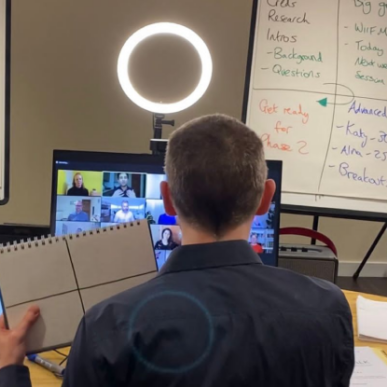“The truth is when you’re dealing with people, it will always be personal“
It’s Always Personal: Why Relationships Matter in Business
“It’s nothing personal, it’s strictly business.”
The famous line from The Godfather – and also quoted recently by Sylvie in the Netflix series Emily in Paris (which is what prompted this blog!)
The phrase ‘it’s not personal, it’s just business’ is often used as a justification for decisions that might not be popular or well-received. But the truth is when you’re dealing with people, it will always be personal. Businesses are made up of individuals and their emotions, and any transaction between two parties has a human element to it.
No matter how carefully crafted or calculated business deals may seem on the surface, at their core they involve relationships between people—relationships that require mutual respect and understanding. It doesn’t matter if those people are in the same room or on opposite sides of the world; relationships are what make business work.
When we talk about ‘business’ we’re really talking about people – customers and employees alike – who have different needs and motivations. Understanding those needs requires empathy and connection; elements that can’t exist without emotion. So although ‘it’s not personal, it’s just business’ is often used as an excuse for cold decision making, in reality, there is no such thing as ‘just business’.
The personal element is all around us in the business world. If you care about your clients, it’s personal. If you have a passion for your work, it’s personal. How your treat your team or employees is personal. Many of us will spend at least 35 hours a week working, and unless you are a robot it’s hard not to have some personal connection during that time.
So if it is personal, how can we make sure we are building the best relationships even with people we wouldn’t normally connect with outside of work?
You don’t have to like everyone
It would be impossible to get on with everyone in the workplace, I’m sure we can all think of someone who might rub us the wrong way or get under our skin. But here’s the thing – you don’t have to like everyone but you should try to understand them. Understanding means being respectful of other people’s opinions, differences, and backgrounds and communicating openly and with empathy.
Don’t avoid intimacy
It can be daunting, but sometimes ‘good business’ requires getting personal. We often shy away from intimacy because we think it’s about being soft and emotional or sharing something private, but being intimate in business is about creating safety and connection. If you want others to trust you, you need to get comfortable with being vulnerable and sharing your own experiences. Showing a willingness to be open lets other people in and creates a stronger bond.
Enough about me, let’s talk about me
Being open is great, oversharing and being self-orientated isn’t. Good conversations happen when both parties share and listen. Don’t make it all about you, take the time to ask questions and listen to what other people have to say because the most direct way to empathise and make the other person feel heard is to listen well. When people feel heard and respected, they trust each other more which leads to better working relationships.
Be reliable
Another key aspect of building strong relationships is being reliable and accountable. This comes not only from delivering on promises but also by living up to your own values and expectations. People won’t trust you if they don’t feel as though you’re trustworthy and that means keeping your word even when it’s hard.
Be kind
The Harvard Business Review recently wrote that data from the field of social psychology shows that leaders who demonstrate positivity and kindness to their teams simply do better. Never underestimate the power of kindness. We all have bad days, and how we handle them can make or break a relationship. Being kind to others is not only the right thing to do but it’s also beneficial in business. It builds trust, and loyalty and helps create a positive work environment which boosts morale and productivity.
Finally, people may often say ‘it’s not personal, it’s just business’ to avoid conflict. But in reality, conflict is a good thing because it allows us to confront our differences and find a compromise. Conflict handled well brings teams closer together and helps create stronger relationships. So remember that there’s no such thing as ‘just’ business – the personal element is always there.


















